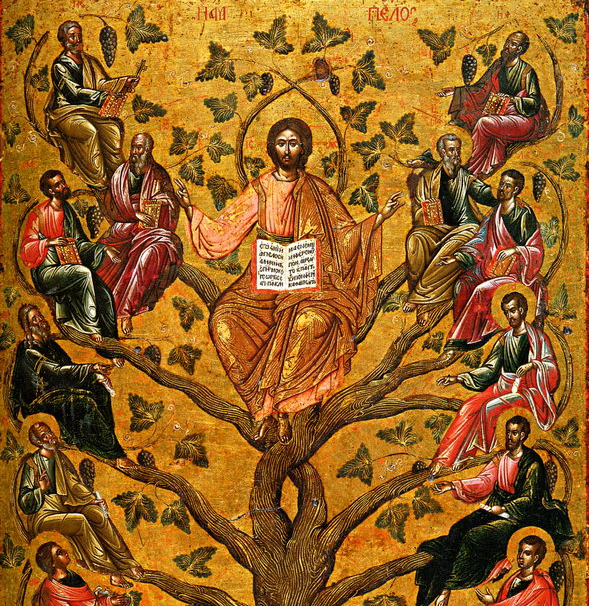Christian Art | Jesus And A Boy At Prayer | Easter To Pentecost
Office Of Readings | Eastertide Week 5, Saturday | A Reading From The Discourse Of Saint Augustine On The Psalms | Jesus And The Paschal Alleluia
‘Jesus and the paschal Alleluia.’
The Praise Of God | Our Present Training For Eternal Joy
Saint Augustine begins by asserting that our lives on earth should center on the praise of God because this is what we shall do eternally in heaven. His well-known anthropology, articulated in the Confessions (Book I), declares, ‘You have made us for yourself, O Lord, and our hearts are restless until they rest in you.’ In this restlessness, Augustine sees a divine gift: a yearning that trains us for heaven. The joy of praising God is not merely a future reward but a present discipline that forms the soul in divine love.
Praising God, for Augustine, is both a duty and a delight. It is not limited to words or songs but must encompass one’s whole being. This theme resonates with his exhortation in the Enarrationes in Psalmos (Expositions on the Psalms), where he frequently emphasizes that the Psalms teach the Church how to pray, hope, and praise with the voice of Christ.
Yearning And Trust In The Promise
Augustine speaks of our condition as one of both rejoicing and longing. We rejoice in the promise of salvation and resurrection, yet we yearn because its full realization is still to come. This ‘already and not yet’ tension is a hallmark of Augustine’s eschatology, rooted in Pauline theology. Romans 8:23 expresses this yearning: ‘We ourselves, who have the firstfruits of the Spirit, groan inwardly as we wait eagerly for adoption to sonship, the redemption of our bodies.’
This yearning is not passive. It is active, liturgical, and formational. It shapes our petitions to God and draws us into deeper communion with him. Modern theologians, like Sarah Coakley, have noted how desire and waiting are not signs of weakness but of spiritual depth. Augustine’s view reinforces the idea that holy longing is itself a form of praise.
Liturgical Seasons As Spiritual Markers
Augustine draws attention to the Church’s division of time into liturgical seasons, highlighting Lent (pre-Easter) and Eastertide (post-Easter) as reflections of human life. Lent is characterized by fasting and prayer, signifying the trials and struggles of this life. Eastertide, marked by celebration and Alleluia, represents the eternal joy to come.
This duality mirrors Augustine’s theology of time in Confessions XI, where he distinguishes between chronos (sequential, earthly time) and kairos (God’s sacred, eternal time). The liturgical calendar serves as a pedagogy of salvation history. In celebrating the resurrection now, the Church anticipates the heavenly reality it does not yet fully possess.
The Easter Alleluia | A Song Of Resurrection And Unity
‘Alleluia’ is not just a joyful acclamation; it is a word laden with biblical and liturgical meaning. Its Hebrew origin means ‘Praise the Lord’ (from hallel and Yah). In the ancient Church, the Alleluia was absent from the Lenten liturgy, returning only at Easter in jubilant celebration. This reintroduction marked a transition from mourning to joy, from crucifixion to resurrection.
Augustine highlights how the Church, through the Alleluia, urges itself to continual praise. This communal exhortation reflects the Church’s identity as the Body of Christ, encouraging one another as members of a single organism. The Alleluia becomes a sign of unity and eschatological hope, linking the voices of the faithful with the eternal praise of angels in heaven (cf. Revelation 19:1-6).
Worship As Life, Not Just Liturgy
A central theme in the discourse is that praise must not cease when one leaves the church. True Alleluia is lived, not just sung. Augustine warns that the voice alone does not constitute praise unless it is accompanied by righteousness. In other words, holiness is the sound of praise made manifest in action.
This idea aligns with Augustine’s broader theology of virtue and grace. In his writings, justice (iustitia) and right living are not merely moral requirements but responses to God’s love and grace. When the believer lives justly, their life becomes a hymn to God. Even in silence, their good works resound with Alleluia.
Christ As The Model | Passion And Resurrection
Finally, Augustine places Christ at the centre of the liturgical and spiritual narrative. The passion of Christ corresponds to our earthly suffering, while his resurrection signifies the glory we await. In this framework, Christ is both exemplar and enabler. We are joined to his suffering through our trials and joined to his glory through hope and grace.
This pattern follows the Pauline logic of Philippians 3:10-11: ‘That I may know him and the power of his resurrection, and may share his sufferings, becoming like him in his death, that by any means possible I may attain the resurrection from the dead.’ Augustine, through his preaching, makes clear that the Church relives this pattern liturgically and personally.

A Reading From The Discourse Of Saint Augustine On The Psalms | Jesus And The Paschal Alleluia
Our thoughts in this present life should turn on the praise of God, because it is in praising God that we shall rejoice for ever in the life to come; and no one can be ready for the next life unless he trains himself for it now. So we praise God during our earthly life, and at the same time we make our petitions to him. Our praise is expressed with joy, our petitions with yearning. We have been promised something we do not yet possess, and because the promise was made by one who keeps his word, we trust him and are glad; but insofar as possession is delayed, we can only long and yearn for it. It is good for us to persevere in longing until we receive what was promised, and yearning is over; then praise alone will remain.
Because there are these two periods of time – the one that now is, beset with the trials and troubles of this life, and the other yet to come, a life of everlasting serenity and joy – we are given two liturgical seasons, one before Easter and the other after. The season before Easter signifies the troubles in which we live here and now, while the time after Easter which we are celebrating at present signifies the happiness that will be ours in the future. What we commemorate before Easter is what we experience in this life; what we celebrate after Easter points to something we do not yet possess. This is why we keep the first season with fasting and prayer; but now the fast is over and we devote the present season to praise. Such is the meaning of the Alleluia we sing.
Both these periods are represented and demonstrated for us in Christ our head. The Lord’s passion depicts for us our present life of trial – shows how we must suffer and be afflicted and finally die. The Lord’s resurrection and glorification show us the life that will be given to us in the future.
Now therefore, brethren, we urge you to praise God. That is what we are all telling each other when we say Alleluia. You say to your neighbour, ‘Praise the Lord!’ and he says the same to you. We are all urging one another to praise the Lord, and all thereby doing what each of us urges the other to do. But see that your praise comes from your whole being; in other words, see that you praise God not with your lips and voices alone, but with your minds, your lives and all your actions.
We are praising God now, assembled as we are here in church; but when we go on our various ways again, it seems as if we cease to praise God. But provided we do not cease to live a good life, we shall always be praising God. You cease to praise God only when you swerve from justice and from what is pleasing to God. If you never turn aside from the good life, your tongue may be silent but your actions will cry aloud, and God will perceive your intentions; for as our ears hear each other’s voices, so do God’s ears hear our thoughts.

Glossary Of Terms
Alleluia
A Hebrew word meaning ‘Praise the Lord’. In Christian liturgy, it is a joyful acclamation of praise, especially emphasized during Eastertide to celebrate the Resurrection of Christ.
Eastertide
The liturgical season beginning on Easter Sunday and lasting until Pentecost. It is a time of joy and celebration of Christ’s victory over death.
Liturgical Seasons
The cycle of seasons in the Church calendar (Advent, Christmas, Lent, Easter, Ordinary Time) that guide the rhythm of worship, reflection, and celebration throughout the Christian year.
Psalm
A sacred song or hymn, particularly those found in the Book of Psalms in the Bible. Augustine wrote extensive commentaries (Expositions) on the Psalms.
Exposition
A detailed explanation or commentary on a text, especially Scripture. Augustine’s Expositions on the Psalms are theological reflections and practical teachings.
Justice (in Augustinian context)
Right relationship with God and others; living according to God’s will. For Augustine, true praise of God is inseparable from a just and virtuous life.
Pilgrim Church / Earthly Life
A theological term referring to the Christian life on earth as a journey toward the eternal homeland of heaven. Augustine often contrasts this life of ‘yearning’ with the future life of ‘possessing’ God in full.
Praise
In Christian theology, the act of glorifying God for who He is. It is not only verbal but includes one’s actions, thoughts, and intentions.
Longing / Yearning
Spiritual desire for God and the fulfillment of His promises. Augustine sees this yearning as characteristic of the present life, leading to future joy.
Resurrection
The rising of Jesus Christ from the dead. It is the foundation of Easter and symbolizes the promise of new life and eternal joy.
Glorification
In Christian belief, the final stage of salvation when the faithful are fully united with God in heaven. The Resurrection prefigures this glorification.
Liturgy of the Hours (Divine Office)
The official set of daily prayers prescribed by the Church to mark the hours of each day and sanctify the day with prayer. This reading appears in the Office of Readings.
Saint Augustine of Hippo (354–430)
A Church Father and Doctor of the Church whose writings shaped much of Western Christian theology, especially on grace, the Church, and the human longing for God.
Mystical Body of Christ
A term used to describe the Church as united with Christ, its head. The faithful, as members, participate in His life and mission.
Church Militant / Triumphant
Terms describing the Church on earth (still in struggle) and the Church in heaven (already in glory). Augustine often contrasts the present life with the future life in God’s presence.








